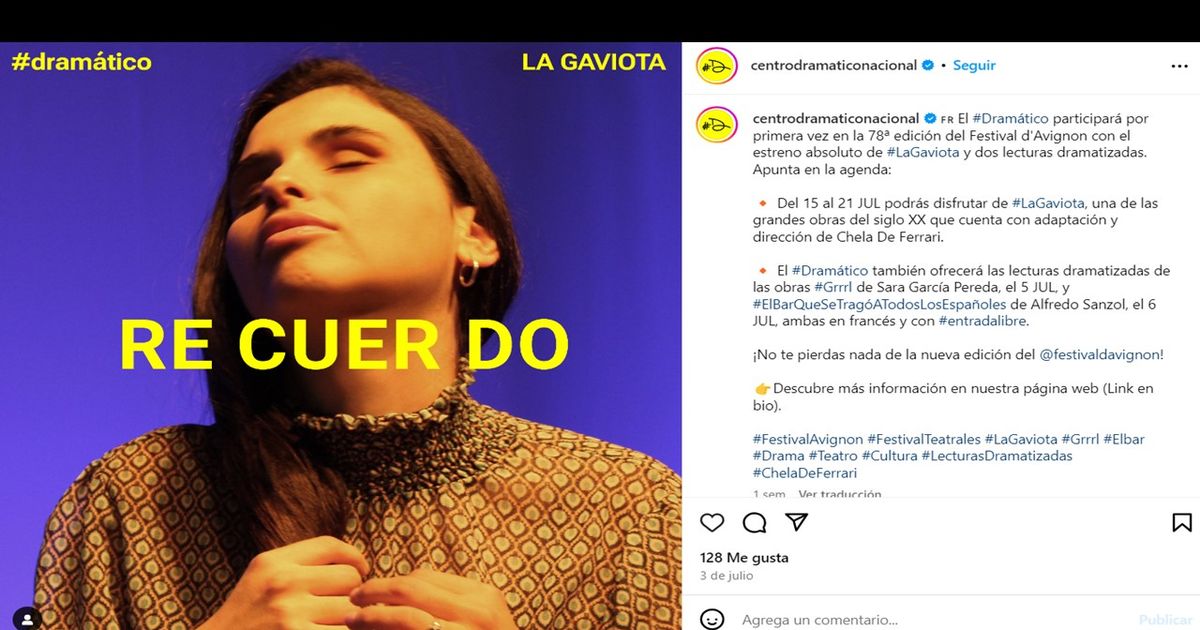MADRID.- In the assembly of Seagullby Russian Anton Chekhov, which is being rehearsed by a company of actors Spanish blind people, there are no sets, the stage has marks on the floor and an actress and stage manager provides audio description.
“In Chekhov, his characters in general are characters who are looking for a lost paradise, with ambitions greater than their strength and possibilities,” Chela de Ferrari explained to AFP during rehearsals in Madrid for this play. constructions, which will be presented at the famous theatre festival in the French city of Avin starting today, July 15.
“I thought all of these characters would connect very well with a cast of blind actors,” Ferrari concluded.
Accustomed to working in inclusion, after having directed Hmlet With actors with Down syndrome, the Peruvian playwright tackles another great piece of theatre with an unusual cast: of the dozen actors in the company of the National Dramatic Centre of Madrid, only two can see.
The rest are blind or visually impaired (with only 10% vision).
But on stage, without white canes or dark glasses, the audience does not know who is blind and who is not.
Chela de Ferrari plays with prejudices. It is the stage manager (an actress, Macarena Sanz, in charge of organizing the movements on stage), with headphones on and a notepad in her hand, who explains that she wants to make the invisible visible, and shows the audience the missing furniture and sets, while describing the audience to the cast.
Nina, played by Beln González, blind from birth and a non-professional actress, comes to the stage.
The body of this 25-year-old, whom she herself has never seen, moves with a particular grace through space, and sometimes she has to look for the shoulder of her co-star Agus Ruiz, a clairvoyant, who plays the role of Boris.
“I see Belen and I feel absolutely fascinated because a sighted actress could never do it like she does,” said Chela de Ferrari, who does not want to romanticize anything. “Actors have been told that if they have to search and if they stumble, well, no problem.”
“Some of them thought it was going to be a setup where I was going to ask them to pretend to see, and that’s not the case,” De Ferrari added.
The verbatim
Disability even becomes a plot device, as in the sex scene between Nina and Boris on a dance floor, surrounded by blind actors. “They make love alongside blindness, taking advantage of the blindness of their partners.”
Beln Gonzalez explained that she had no problem bringing vulnerability and struggle to her character Nina, after having heard since she was little that everything was going to be more difficult for her because she was blind.
“This emphasizes the fact that Nina can’t see, that she moves differently,” Gonzalez added. “Chela loves my body movements and that going to look for and not finding, but continuing, and that frustration, work very well with the character.”
The company only has 38 days of rehearsal time, during which they have to fine-tune a staging that includes several group dances, one with techno music that repeats lines from Chekhov’s text, and a delirious karaoke scene.
“The adaptation of the space is essential. I don’t see anything at all,” said Lola Robles, who plays Arkdina and has experience in inclusive works.
As an accessibility advisor for the play, Robles devised a system of tassels suspended behind the curtains so that the actors would know which backstage area they had entered.
Thin strips of wood have been nailed to the floor in the shape of a cross, which indicate to the actors where they are.
“We can’t see, but we orient ourselves by the sound of footsteps on stage. Sometimes we ask others to sigh to locate them, or to snap their fingers,” he described, wanting at all costs to avoid anyone taking them by the arm to accompany them.
FUENTE: AFP

